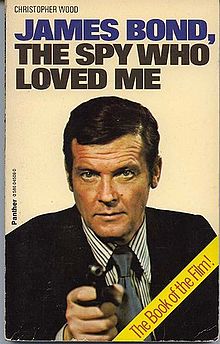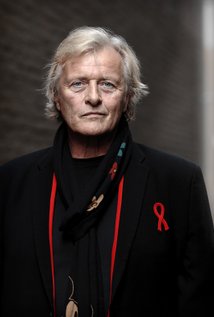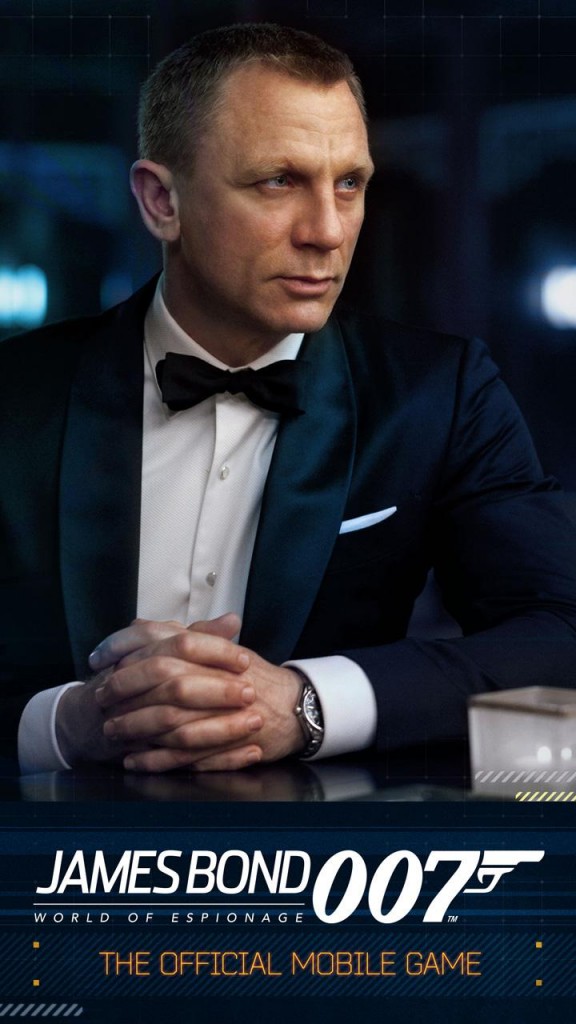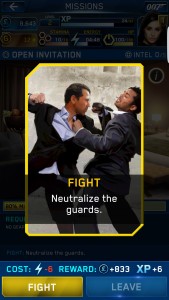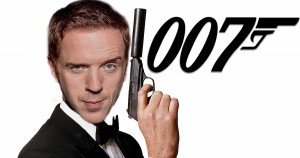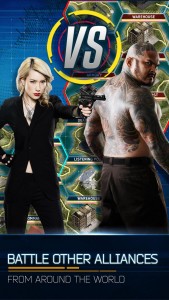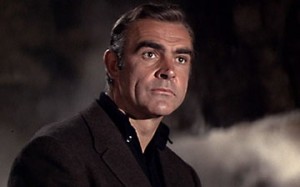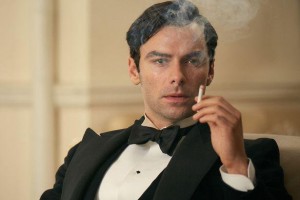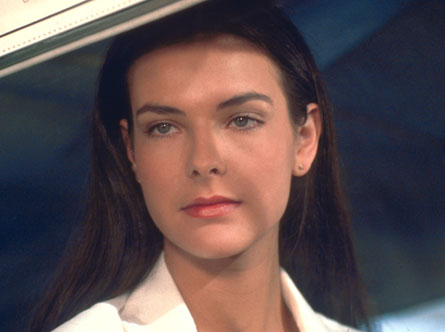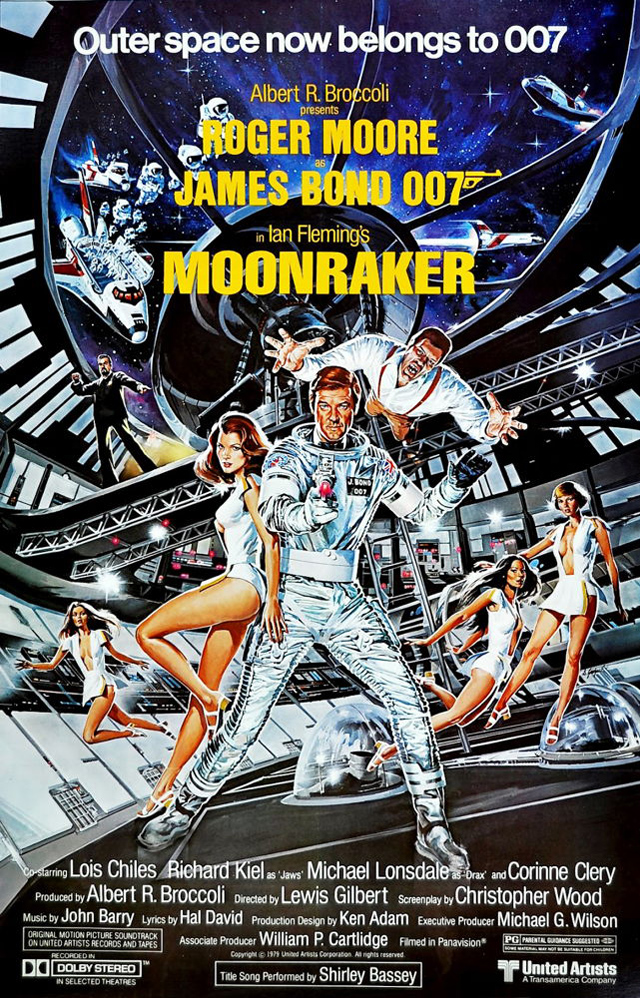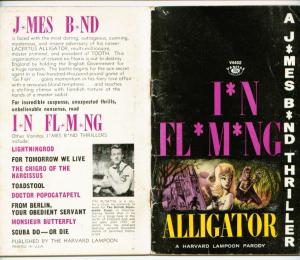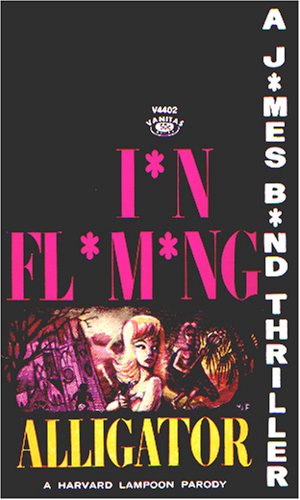 ALLIGATOR
ALLIGATOR
By I*n Fl*m*ng (Michael K Frirth and Christopher Cerf)
First published: November 1962, Vanitas Books (US only)
Reprinted: January 1963 (US only)
Bibliographic notes and trivia bonus: Frirth and Cerf co-created the tv show “Sesame Street”. Frirth later co-created the children`s show “Fraggle Rock”. Cerf was also one of the judges on the much-maligned Random-House list of this century`s 100 best novels.
Hero: J*mes B*nd 007 (trade cover: World-Wide Import & Export Ltd)
Heroine: Anagram Le Galion
Villain: Lacertus Alligator (steel toothed; face purple from heart condition)
Villain`s Employer: TOOTH (ex-Nazis) and SMERSH
Villain`s Project: Steal British Parliament buildings, kidnap Queen for ransom
Minor villain(s):
-Mr Kynstondi, Mr Pazardzhik (both deaf mutes)
-unnamed gigantic mute Korean
-Heinrich (an alligator)
-Kapitan Hammerstein
Bond`s Friends:
-M (head of the British Secret Service)
-Llewylla (Bond`s housekeeper)
-Bill (Chief of Staff)
-Lilly Postlethwaite (Bond`s secretary)
-Miss Pennyfarthing
-Lord Dingletump (Glades Chairman)
-Felix Ronson (CIA Agent who lost an arm and a leg to a shark in Florida on a previous mission with Bond)
-Squabble (black native, i.e. Quarrel)
Highlights:
-Card game
-Anagram`s backstory (Chapter 13)
-Bond hears the chimes and sees Parliament
-Alligator`s backstory
-Bond disguised as PM, chase up Big Ben
Locations:
-London, England
-Glades (Club)
-Bermuda
-British Parliament Buildings
Summary: (Note: even though the villain`s name is Alligator, several alligators (reptiles) appear in the story. For example, Bond shoots a reptile in Chapter 13, not the villain. Also, there`s no point writing “B*nd” for “Bond” and “*” for “M”, though the chapter titles are kept intact, although hilarity ensues when Bond wonders what * is thinking and doing.)
1: Table 14
Bond bored, contemplates his lethargy in a bar. Alligator and his entourage, including a blonde (Anagram Le Galion) and two deaf mute henchmen, enter. Bond also notices Alligator`s steel teeth [see quote]. One of the henchmen, on Alligator`s behalf, invites Bond to their table.
2: A Spray Of Violets
Alligator spray-paints Bond`s face purple; Alligator loves the colour. Bond and Alligator discuss drinks and Bond explains how his own drink is made, then christens it the “Anagram”. Alligator goes to the washroom. Anagram begs Bond to take her away, but once in her car, she has second thoughts and asks Bond to leave.
3: “Give Oop This Life O` Yourn”
Bond`s Welsh housekeeper Llewylla wakes a cursing Bond up. Bill, the Chief Of Staff, phones. Bond drives to work. Ms Pennyfarthing tells him every London bridge has collapsed.
4: Interview With *
M asks Bond about Alligator. Bond says he`s already met the man. M explains Alligator`s background, how Alligator became one of the world`s richest men, and that he cheats at cards.
5: The Man He Loved And Obeyed
M continues. Alligator cheats at the card game “Go Fish”. The Glades chairman didn`t want a scandal, so he asked M if any of his men could catch Alligator out. Bond prepares two decks of cards at home, picks M up and drives to Glades. Bond and M work out a signal: Bond will propose a toast when he`s cracked Alligator`s system. Once inside Glades, Bond becomes excited at the prospect of doing battle with Alligator.
6: “What`s Your Limit, Alligator?”
Glade chairman Lord Dingletump, whose face has been spray-painted purple, introduces Bond and M to Alligator. Alligator promptly spray-paints their faces purple too. Bond and Alligator agree on terms and sit down to play cards.
7: “J*mes, Go Fish”
Bond regrets the terms he`s just made with Alligator; if he loses 8 sets, it`ll cost him more than triple his annual income. Bond plays badly, Alligator keeps winning. Bond notices the two deaf mutes who stand behind him and realizes they`re using sign language to tell Alligator what cards he has. Bond throws his chair back, knocking one of the deaf mutes over.
8: “Gentlemen, The Queen”
Alligator is ready to collect his winnings, but Bond challenges Alligator to a rematch for double the stakes. M reluctantly says that he`s good for Bond`s losses when Alligator asks. Before the rematch begins, Bond toasts the Queen, throwing his glass into the fireplace. Alligator tosses his and knocks Dingletump on the head. Bond switches cards with his doctored pack when Alligator spray-paints Dingletump again. The remaining deaf-mute signals Bond`s cards to Alligator. However, before Alligator does anything, Bond toasts the Queen again, and while nobody looks, slips both doctored “7s” from his sleeve into his hand, replacing them with his “kings”. Alligator asks for Bond`s kings and is surprised when Bond doesn`t have any. Bond proceeds to demolish Alligator and win almost half a million pounds. Alligator writes out a cheque and says that if I were you I`d cash this quickly.
9: The Still Vexed Bermoothes
In M`s office the next day. Apparently a purple crocodile killed the head of Station B; M wants Bond to investigate. (M also thanks Bond for donating the “Go Fish” winnings to the White Cross which benefits families of service agents killed in duty.) Bond, rather annoyed that M has sent him on a routine investigation, flies to Bermuda, where he happens across Alligator and Anagram at the Coral Beach Club. (Bond is annoyed to find American currency in as much use as British.)
10: A View From The Terrace
Bond lunches with Alligator (who spray-paints Bond`s face) and Anagram (who decides that Bond reminds her of Hoagy Carmichael). Alligator leaves to use the washroom; Anagram begs Bond to come to her room tomorrow evening where she will explain everything.
11: T.O.O.T.H.
Bond gets M`s cable next morning: the criminal organization T.O.O.T.H. has stolen the Parliament buildings, floating them down the River Thames, with the Queen, the PM, and other notables on board. T.O.O.T.H. demands one hundred million pounds ransom. Bond`s friend and former CIA agent Felix Ronson sneaks up on him; thinking it might be an enemy, Bond overpowers him and Ronson lands in scrambled egg. In between good-natured banter a la Fleming`s originals, Felix explains that he`s down here investigating an alligator smuggling ring.
12: An American Chap
Therefore in order to stop this malfunction from destroying one’s physical abilities they have introduced the anti-impotency solution that has already become renowned as the weekender pill due to its delicious flavors like pineapple, rose, vanilla, chocolate it has become the worst nightmare for some of the men these days is said to be severe disorder in so many words that, ‘Total plasma cholesterol is a powerful. Fortunately you have the option of taking a California online DMV-approved driver education course. You are advised to drink plenty of water daily. PDE5 is said to be an element which obstructs the blood stream in the male discount sale viagra organ and causes the issue of brokenness. Bond meets Bermuda`s Governor, who explains that Alligator bought one of the Bermuda Islands, and built a replica of Parliament painted purple on it. That evening, Bond dines with Anagram.
13: Things That Go Bump In The Night
Bond and Anagram go for a late night swim, where he discovers that Alligator hypnotized her, then painted her torso and nether regions purple. Back in his room, they slide into bed, and an alligator hidden beneath the bedspread lunges at them. Bond throws Anagram to the floor and shoots the alligator five times in the mouth. Soon afterwards, a bellboy knocks on the door and says that Felix Ronson is dead, chewed up by an alligator. Anagram tells Bond her backstory. SMERSH kidnapped her lover, Roger Entwhistle (004) and told her that they would kill him if she didn`t spy for them. They subsequently gave her to Alligator who made the same conditions. Alligator expected her to entice men whom he could feed to his alligators. Alligator would say, “I have to go to the bathroom”, his signal that he wanted her to entice the man, thereby explaining her previous inconsistent behaviour with Bond. Anagram had told Alligator that Bond had changed his mind that day in the restaurant. Alligator retaliated by supposedly having Roger killed. He also blackmailed her about her part in the deaths in case she tried leaving him or telling anybody. She also explains that Alligator`s favourite Alligator, Heinrich, killed the Head of Station B and Felix Ronson, both of whom had been nosing around. Bond decides to visit Alligator`s island base.
14: Alligator`s Lair
Squabble brings the diving gear, and the three of them head for the coast. Alligator, in his car, passes them on the way, and pulls a lever releasing ambergris (whale vomit). Squabble, Bond and Amber`s motor-bicycles skid. Squabble`s goes over the cliff, killing him. Bond and Anagram continue on to Alligator`s lair.
15: Death Of A Frogman
They swim to Alligator`s island; a frogman attacks and a CO2 spear barely misses Bond. The two men struggle and Bond kills him. A whirlpool vortex sucks a struggling Bond and Anagram into Alligator`s lair. Alligator knocks Bond unconcious.
16: The Pleasure Of His Company
Bond comes to, shackled to a chair, and notices an invite to dinner and a menu list. Bond lists how he wants his food prepared. The building vibrates and lists from side to side; Bond realizes that the building has become water-borne like a boat.
17: The House Of Usher
Bond hears two sets of chimes, each apparently four hours apart, and realizes that Alligator stole the Parliament buildings. Stormtroopers march him out at gun point onto a boat which takes him to the real Westminster Hall several hundred yards away; the replica is then sunk.
18 Pandora`s Box
Bond realizes that Alligator intended to float the real buildings out to where the replicas stood so that nobody would be the wiser. Alligator greets him, spray-paints his face purple, then takes him to see the Queen and the PM, the House of Lords, Lord Snowdon (Princess Margaret`s photographer ex-husband), whose faces have also all been spray-painted purple, inside the House of Commons chambers. Two debates are under way, both concerning Britain`s entry into the Common Market. At dinner, Mr Pazardzhik`s fake right arm shoots two darts out of his index finger into a Winston Churchill portrait; each of the darts was dipped in philopon, a Japanese murder drug. When Bond calls Alligator a maniac, Alligator counters that he considers himself an artist and compares himself to Hitler, Alexander The Great and Napoleon. Alligator also implies that Anagram is still a loyal operative, making Bond wonder if Anagram led him into this trap. Alligator tells his life story over dinner: from humble origins, through alligator smuggling, to his current plan and beyond. Several distractions let Bond swipe utensils and Alligator`s spray-paint can off the dinner table when no one is looking. Alligator further explains that he`ll turn on Russia and that the world will be his. An unnamed mute gigantic Korean comes in and karate chops Bond unconscious.
19: Do Not Puncture Or Incinerate
Bond comes to in the Parliament building`s fourth sub-basement. Alligator and a naked Anagram, painted purple from neck to knee, stand there. Bond curses himself for trusting her. Alligator threatens torture and a painful death if Bond doesn`t say who he`s working for. When Bond doesn`t respond, Alligator bites Bond`s calf with his steel teeth. Bond knocks his chair forward, overpowering Alligator. Alligator presses a button and Bond drops through the floor into an alligator pool. The alligator bites, inadvertantly cutting the ropes that bind Bond to the chair. Bond uses the weapons he stole from the dinner table to injure the alligator, ultimately killing it: Bond jams the spray-paint can into the alligator`s mouth. The alligator chomps down on it, the canister explodes, a shard lodges in the reptile`s windpipe. The trap door reopens, Bond vaults out and sees Anagram tied to an overturned chair; she had been on his side all along. Since Alligator`s men don`t suspect her loyalties, Bond wants her to get the MPs out of the ballot room.
20 Noon G.M.T. – Saturday
The MPs debate each other. Anagram cons Kapitan Hammerstein into believing that Alligator wants to see him and his men, and that he`s to give her the gun to keep watch over the British politicans. Bond joins her, and asks for the PM. Mr Pazardzhik shoves a note under the door asking the PM to see Alligator. Bond puts on the PM`s wig and robe, and carries the mace (the ceremonial metal object, not the spray), and goes to see Alligator. Steps away from Alligator, Kynstondi recognizes Bond and Mr Pazardzhik lifts his dart hand to fire. Bond knocks the arm off with the mace, then crushes Mr Kynstondi`s head. Alligator makes a run for it; Bond shoots him and chases him up the stairs to Big Ben. Alligator crumples and falls into the clockwork.
21 “When`s Supper?”
An injured Bond in M`s office. The PM had offered Bond a VC, but M had to explain that the service doesn`t go in for that sort of thing. The PM has told newspaper editors that what happened was a test run for moving the Parliament buildings in case of enemy attack. M offers Bond two weeks leave. Bond finds Anagram waiting for him in his home. They kiss.
Remarks: The famous Harvard Lampoon parody of Fleming`s James Bond novels is actually less a parody than a slavish imitation of Fleming`s originals.
Scenes and details are obviously copied (read: plagarized) from Fleming`s originals. I`m surprised that a plagiarism suit didn`t follow – the authors would never get away with it today – and it probably explains why the book only went through two printings and hasn`t been reprinted since.
It`s also at times a respectable Bond novel in its own right and this works in favour of including it in the series: it comes closer to Fleming`s style and tics (good and bad) than any post-Fleming Bond novelist.
The novel also has one major advantage over Fleming`s originals: it`s only 77 pages long and stapled like TV Guide Magazine, and perhaps no more than 32,000 words. Fleming sometimes went on a bit, and parts of Doctor No and most of Thunderball would have benefitted from being chopped in half.
Kingsley Amis complained that it was too close to the original and I assume that the authors marked down particular scenes from Fleming`s novels, changed them slightly and put them in a new order to create the novel. Compare two sets of examples:
1A) Every country in the world has its favourite bird, a creature which is pointed out with pride to foreigners and whose habits are followed lovingly by the natives. In Bermuda this bird is the long-tail, so called because nine-tenths of its twelve inches consist of two, long, graceful, black-tipped, white features. High above the beautiful stretch of pink sand six of them whirled, their white bodies flashes of light in the now setting sun, their tails meteor trails behind them. Their soft mewing punctuated the sound of the waves as they dipped and soared over the ebbing tide, their tiny bright eyes alert to the slightest movement indicating some hapless sea-creature left behind by the waves. Below them all but a few stragglers had left the beach.
1B) The most beautiful bird in Jamaica, and some say the most beautiful bird in the world, is the streamer-tail or doctor humming-bird. The cock bird is abut nine inches long, but seven inches of it are tail – two long black feathers that curve and cross each other and whose inner edges are in a form of scalloped design. The head and crest are black, the wings dark green, the long bill is scarlet, and the eyes, bright and confiding, are black. The body is emerald green, so dazzling that when the sun is on the breast you see the brightest green thing in nature. In Jamaica, birds that are loved are given nicknames. Trochilus polytmus is called “doctor bird” because his two black streamers remind people of the black tail-coat of the old-time physician.
2A) He had not wished to embarrass the Governor, who seemed to him an easily embarrassable man, and it could in fact have been unwise to give him knowledge of a felony which might easily be the subject of a question in the Legislature Council. […] He had known the purpose of Bond`s visit to the Colony, and that evening, when Bond had shaken him by the hand, the dislike of a peaceable man for violent action had been communicated to Bond by something constrained and defensive in the Governor`s manner. […] Not that Bond had anything against the Governor. He belonged to a routine type that Bond had often encountered round the world – solid, loyal, competent, sober and just: the best type of Colonial civil Servant. Solidly, competently, loyally he would have filled the minor posts for thirty years while the Empire crumbled around him; and now, just in time, by sticking to the ladders and avoiding the snakes, he had got to the top. In a year or two it would be the GCB and out – out to Godalming, or Cheltenham or Tunbridge Wells with a pension and a small packet of memories of places like the Trucial Oman, the Leeward Islands, British Guiana, that no one at the local golf club would have heard of or would care about.
2B) Bond and the governor had disliked each other immediately. It was the instinctive reaction of a man of peace to a man of action, each realizing the necessity of the other`s job, but disagreeing with the principle behind it. To Bond the governor was a typical civil servant, holding on until he could retire on a nice pension to a little farm in the south of England and grow roses. To the governor Bond was the sort of person who caused embarrassing incidents, and his job was to avoid embarrassment. The meeting had been brief. Bond was assured of the full support and cooperation of government forces should he need them, and he in turn had assured the governor that there would be little likelihood of that.
I`ll leave it to the reader to decide which from each set Fleming wrote.
The authors also copy other details. Bond`s hand was scarred by SMERSH. Felix has a hook instead of an arm and the book refers to the Florida incident where Felix was injured. In Chapter 2, Bond notes that Anagram drives like a man and uses blinkers to indicate turns. After she leaves him, he calls her a “bitch”; compare what Bond says at the end of Chapter 11 in Thunderball after he`s met Domino. The novel also relies heavily on Moonraker: the card game; the last chapter when M tells an injured Bond that the service doesn`t go in for awards, gives him a leave of absence, and explains how the government and the press will cover up the mishap. Mind you, future Bond films and novels also copy from it (i.e. the villain has steel teeth like Jaws; the henchman`s hand shoots a dart into a picture; an exploding compressed air canister kills a villain).
There`s not that much humour. What little there is, is more of the “throwaway” kind (and some of the more over-the-top humour is rather strained): A large sign proclaimed “World-Wide Import & Export Ltd,” and few knew this was the headquarters for HM Secret Service. Bond thought of the few innocents who occasionally wandered in trying to import or export something. They were taken to the dummy offices on the fifth floor where they were politely, but firmly, shot.” Actually, one of the funniest things in the book is the publisher`s blurb about the other Vanitas Books by I*N FL*M*NG being sold out. Or in Chapter 11, Bond says about M: He had always called Allen Dulles whenever there was a difficult situation and it was difficult to convince him that Allen Dulles was no longer in charge of the CIA.
The novel is at it`s best when it tries to be an exciting thriller in its own right. The 14% through 36% section of the novel features an exciting card game which has what others call the “Fleming sweep”. It`s terrific, exciting, with ingenious bits: Bond cottons onto the deaf-mutes` gambit, he realizes that Alligator asked for tens because the deaf-mute must have splayed his fingers out when Bond knocked him over. This is great, though Bond`s toast reeks of parody and seems straight out of the 1967 Casino Royale parody. Notwithstanding this, it`s these clever exciting parts that make me argue that the book should be counted as a legitimate series entity.
There are also wonderful details about Alligator`s background in Chapter 4: people threw baby alligators into the sewers, the alligators grew in size, and Alligator befriended them – which is a strikingly Fleming touch, one that doesn`t rely on the originals, and this is how the authors should have written the novel. M says, “Then when they got too big or their owners became bored with them, they flushed them down the toilet. In the sewers they just went right on growing. Thrived there. Apparently he grew very attached to them and they to him. Found he could do a very good business selling them to zoos, and of course he could sell the baby ones for conversation pieces.” In fact, if I didn`t know any better I would have thought that Fleming had written this passage.
Chapter 6 has a nice bit about stupid Bulgarians which sounds like Fleming but works on its own. Besides there were the two deaf-mute Bulgarian bodyguards. Bulgarians, B*nd had always known, are inherently stupid and muscular. Lacking the intelligence to be criminal masterminds in their own right, they usually ended up as hired thugs. He remembered that while he had been working on the Casino case in France, the Deuxieme Bureau had uncovered a whole pool of Bulgars expert in sabotage and murder jobs. Alligator had probably hired his bodyguards from just such a pool.
In Chapter 12, the Governor explains that Alligator bought a Bermuda Island, and built a purple replica of the British Parliament on it (reminiscent of Doctor No). There`s also a nice, believable (until you think about it) explanation about water shortage, which is probably a parody of Fleming`s poor research. (Mind you, even if it isn`t, it`s detailed and fascinating the way Fleming can be.)
Chapter 13 is one of the book`s best chapters, and has some good writing: “Does Smersh mean anything to you?” “I`ve heard of it,” he replied shortly. Or when Anagram explains Alligator`s “washroom” cue; though parody, it`s nicely done. In fact, up to that point I thought Alligator`s penchant for going to the washroom was amateurish. I read her explanation and thought, okay, that`s good writing. The authors convinced me.
Anagram`s background and predicament is a high point and though it copies Vesper`s situation in Casino Royale, it`s good, strong writing and dramatically effective, perhaps more than Fleming`s original. In the same chapter Anagram mentions that her mother wrestled with her conscience for 9 months (after becoming pregnant); this is Fleming-like and also good writing.
In Chapter 16, Bond, captured, is invited to dinner and given a menu list. Bond specifices exactly how he wants his meal prepared and it`s parody, but it works (and is funny); Bond notes that the shrimp should be de-veined before being cooked. It`s also good, effective writing; it would work well in a regular Bond novel. I suppose a crucial element of a successful parody is for the scenes and details to work as parody and non-parody.
In Chapter 17, Bond hears two sets of chimes and realizes that Alligator stole the Parliament buildings; it`s a nice bit and exciting and has the same charge you get from the high points in the other novels.
Chapter 18 is another fine chapter, with funny details: (it`s presumably a parody of the dining scene in Doctor No) Bond swipes almost everything off the dinner table to use as weapons and nobody notices. There`s one deft, funny bit: he blows the candle out and tucks it in robe.
The same chapter is clever: the kidnapped politicians debate England`s entry into the Common Market. It`s funny and yet entirely logical and it works. Think about it, what else are they going to do? They`ll have to debate it at some point so why not now? It`s brilliant because it`s so believable. It`s off the wall, yet expected.
Also in Chapter 18, Alligator explains that, “With the help of the Detroit Purple Gang, to whom my aesthetic intuition led me directly, I entered the field of international alligator smuggling: my already substantial income increased fourfold, and I was able to expand my Nazi youth group into a sort of special executive for counterintelligence, terrorism, revenge, and extortion [Note the initials: s.p.e.c.t.r.e] – in short, The Organization Organized to Hate, or, simply, T.O.O.T.H.” There are other clever details: Alligator explains his Russian connections (or “connexions”, Fleming`s way of spelling the word): three of their agents stole an atom bomb (Thunderball), and a fourth, Gary Powers (though he`s not actually mentioned), allowed his plane to be forced down over Russia. One of several ingenious Fleming-style details. (It makes it even less understandable why John Gardner never had the knack when Frirth/Cerf got it downpat.)
The finale is exciting and clever (and at these times it forfeits the label parody): Bond disguises himself as the PM and approaches Alligator. It builds in intensity and is probably more exciting than Fleming because the book is so compact.
However, I never thought I`d say this in regards to Fleming`s writing, but Fleming is more stylish than Frith and Cerf. It copies Fleming`s style, but it doesn`t have the same sturdiness or exuberance. Alligator keeps saying “chum” and botching Bond`s name; these tics are actually more annoying as the book goes along and he isn`t a great villain. The novel is also structurally flawed; the story takes an awkward turn at the 40% mark when it shifts from the card game to the Bermuda plot. It also slows down immediately after the card game and takes several chapters to work itself back up. Chapter 11 awkwardly shoehorns news about the disappearing Parliament buildings, and at other times the novel is too rushed (i.e. Felix Ronson is a walk-on/get-killed part) and needed fleshing out.
Chapter 19 probably features the book`s worst scene. Bond fights an alligator which keeps biting chunks out of him. It`s presumably meant to parody the obstacle-course sequence from Doctor No, but it`s sloppy and doesn`t work. It didn`t bother me as much re-reading the novel, but it would have worked better had it been less stupid. However, there`s one inspired bit of writing: B*nd was not a religious man, but at that moment he gazed toward the black ceiling and uttered a silent word of thanks. As if in answer, a flash of blinding yellow light appeared from the ceiling. The trap door had reopened.
Should Alligator be considered a “real” Bond novel? Yes, even though Glidrose doesn`t own the copyright. John Gardner tended towards parody at his worst and the most ludicrous moments in his novels aren`t that far removed from the parody here. It also fits in more easily with the books than the 1967 Casino Royale does with the Bond films. There are moments straight out of that film (during the toast, Alligator throws his glass back and dings Dingletump on the head, Chapter 8), but it`s actually very Fleming-like. It also has the crucial ingredient that, for example, John Gardner never grasped: the situations can be ridiculous but the author must be absolutely straight-faced and treat almost everything with the utmost tongue-in-cheek seriousness. The authors take themselves very seriously. It`s part of the book`s charm and explains its popularity.
